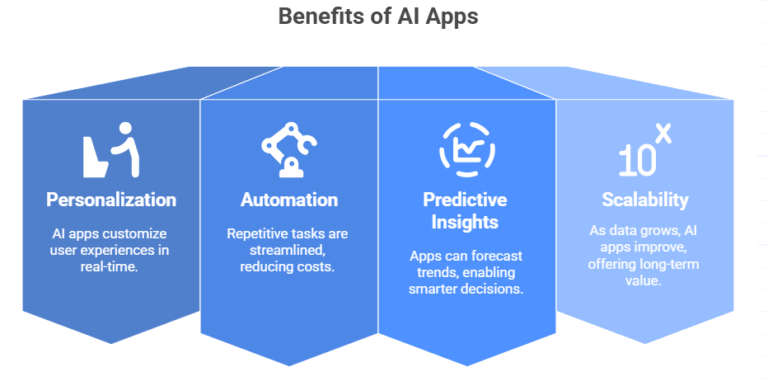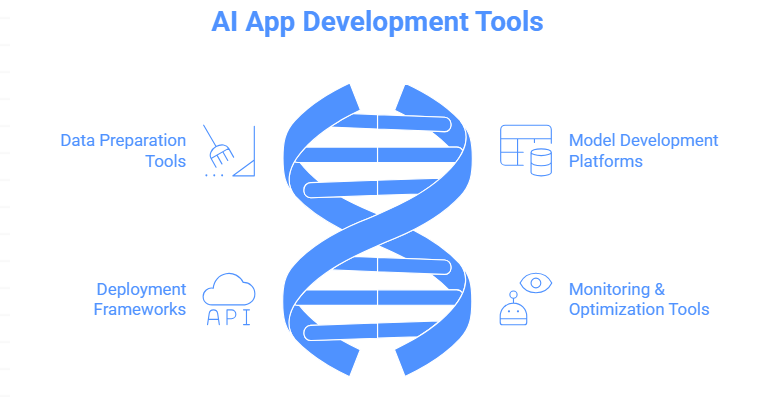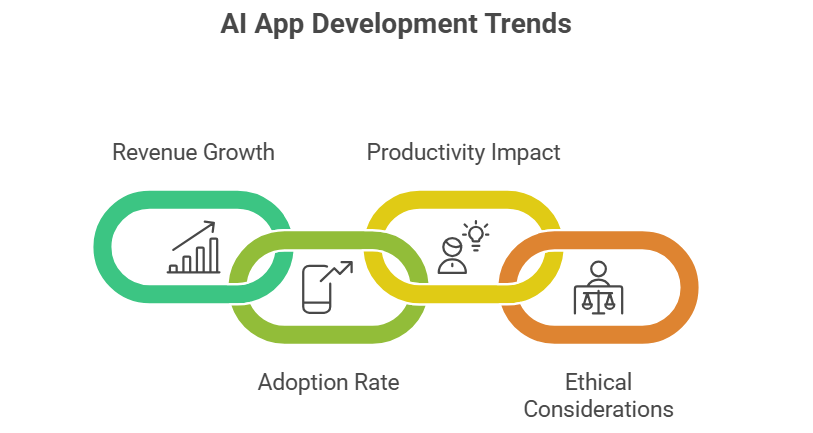Building AI Apps: Essential Tools, Technologies, and How to Get Started
Artificial Intelligence (AI) is no longer a futuristic concept; it is already transforming industries worldwide. From healthcare to finance, logistics to retail, AI-powered applications are driving innovation, efficiency, and new business models. Organizations across every sector are prioritizing AI development to stay competitive. This shift reflects the growing role of AI in shaping how digital products and services evolve.
For companies eager to build their first AI-powered app, understanding the tools, technologies, and development processes is essential. This guide explores what you need to know about AI development company, the latest industry insights, and how to strategically get started.
Why AI Apps Are the Future of Digital Transformation
AI apps bring intelligence and adaptability to digital solutions. Unlike traditional applications, which follow predefined logic, AI apps learn, predict, and make decisions based on data. This dynamic capability unlocks:
- Personalization – AI apps customize user experiences in real-time (think recommendation engines, chatbots, or fitness apps).
- Automation – Repetitive tasks are streamlined, reducing costs and boosting productivity.
- Predictive Insights – Apps can forecast trends, behaviors, or risks, enabling smarter decision-making.
- Scalability – As data grows, AI apps improve, offering long-term value.
According to Gartner, 80% of enterprises will have used generative AI APIs or deployed AI-enabled applications by 2026, a dramatic increase from less than 5% in 2023. This shows how rapidly AI is moving from experimental to mainstream adoption.

Core AI App Technologies to Know
When planning to build AI apps, it is critical to understand the underlying technologies that power them:
1. Machine Learning (ML)
The backbone of most AI apps, Machine Learning enables systems to learn from data and improve performance over time. For example, a retail AI app can analyze past purchase behavior to recommend future products.
2. Natural Language Processing (NLP)
NLP helps apps understand, interpret, and generate human language. From virtual assistants to real-time translation, NLP powers user-friendly AI interactions.
3. Computer Vision
This technology allows AI apps to process and interpret visual inputs from images or videos. It is widely used in healthcare (diagnostics), transportation (autonomous driving), and retail (inventory management).
4. Generative AI
Generative AI can create new text, images, audio, or video. With McKinsey reporting that Generative AI could add up to $4.4 trillion annually to the global economy, this is one of the most influential AI app technologies today.
5. Edge AI
Instead of relying solely on cloud processing, edge AI runs models locally on devices. This reduces latency and enhances privacy, making it ideal for IoT and mobile AI applications.
Essential AI App Development Tools
Choosing the right tools is vital for building robust and scalable AI applications. Here are the categories to focus on:
- Data Preparation Tools – Ensure clean, structured, and usable datasets. Without quality data, AI models cannot perform effectively.
- Model Development Platforms – Tools that allow developers to build, train, and test ML and AI models.
- Deployment Frameworks – Solutions that integrate AI models into real-world apps, whether web-based, mobile, or IoT.
- Monitoring & Optimization Tools – Post-deployment monitoring ensures AI apps remain accurate and unbiased as they evolve with new data.
Today, the market for AI app development tools is expected to grow at a CAGR of 25%+ between 2024 and 2030, reflecting the surging demand for smarter apps across industries.

How to Build AI Apps: Step-by-Step Guide
Developing an AI-powered app requires more than just coding. It involves strategic planning, data strategy, and iterative testing. Below is a streamlined process to help you get started:
1. Identify the Problem and Goal
Define the specific problem the AI app will solve. For example:
- A healthcare app predicting patient risk
- A retail app personalizing shopping recommendation
- A logistics app optimizing delivery routes
2. Gather and Prepare Data
AI thrives on data. Whether structured (databases, spreadsheets) or unstructured (text, video, audio), the data must be cleaned and organized for training models.
3. Select the Right AI Technologies
Choose ML, NLP, computer vision, or generative AI based on your use case. Align these technologies with the app’s purpose and scalability needs.
4. Build and Train the Model
Develop algorithms that can learn from the data and adapt. Continuous training and testing are essential to ensure accuracy and fairness.
5. Develop the Application Layer
Integrate the AI model into a mobile or web application with user-friendly interfaces. Strong UI/UX ensures adoption and engagement.
6. Test, Monitor, and Improve
AI models can drift over time as new data becomes available. Continuous monitoring ensures accuracy, reliability, and compliance with regulations.
Latest Insights in AI App Development
- Global AI software revenue is projected to hit $298 billion by 2030.
- AI adoption in mobile apps has increased 270% in the last four years, led by e-commerce, healthcare, and finance.
- 60% of business leaders say AI will increase productivity significantly, with many already seeing ROI from AI-powered automation.
- Ethics and trust are now top priorities. AI app development must focus on transparency, explainability, and responsible data use.
These insights highlight that AI is not just about technology, it is about creating sustainable, ethical, and impactful digital solutions. As organizations plan what the future of AI development will look like, trends like generative AI, edge intelligence, and automation are shaping long-term strategies.

Getting Started with the Right AI Development Company
Building AI apps requires not just technical expertise but also industry knowledge, compliance awareness, and user-first design. Partnering with an experienced AI development company provides the advantage of:
- Skilled teams with knowledge of AI app technologies and development frameworks
- End-to-end support from ideation to deployment
- Strong focus on scalability, compliance, and long-term sustainability
- Strategic insights into aligning AI with business objectives
Wrapping Up
Artificial Intelligence is shaping the next era of digital transformation. Whether through personalized user experiences, predictive analytics, or automation, AI apps are unlocking new possibilities for businesses worldwide. To succeed, organizations must adopt the right tools, leverage powerful AI app technologies, and work with an experienced AI development company to bring their vision to life.
Companies that prioritize artificial intelligence excellence are gaining a strong competitive advantage through innovation, scalability, and efficiency.
At App Maisters, we specialize in designing and developing innovative AI-powered applications tailored to unique business needs. From strategy to deployment, our team ensures that your AI journey is efficient, ethical, and impactful helping you stay ahead in an AI-driven future.
FAQs
What is the first step to building an AI app?
The first step is identifying a clear business problem that AI can solve. App Maisters helps clients define goals, data needs, and the right AI approach from the start.
Which technologies are most used in AI app development?
Core technologies include machine learning, NLP, computer vision, generative AI, and edge AI. App Maisters leverages these based on your use case and scalability needs.
How much data is required to build an AI application?
It depends on the app’s complexity. AI models need quality data to learn accurately, and App Maisters assists with data preparation, cleaning, and model training.
Can AI apps be integrated into existing systems?
Yes, AI solutions can be embedded into current mobile, web, or enterprise platforms. App Maisters ensures seamless integration with legacy and cloud environments.
What are common challenges in AI development?
Challenges include data privacy, bias, cost, model training, and integration. App Maisters addresses these through ethical AI practices and scalable architectures.
How long does it take to build an AI-powered app?
Timelines vary by scope, features, and data readiness. App Maisters typically delivers AI MVPs faster by using agile development and reusable frameworks.
Why choose App Maisters for AI app development?
App Maisters provides end-to-end AI development from strategy and modeling to deployment and optimization with a focus on innovation, compliance, and ROI.




















